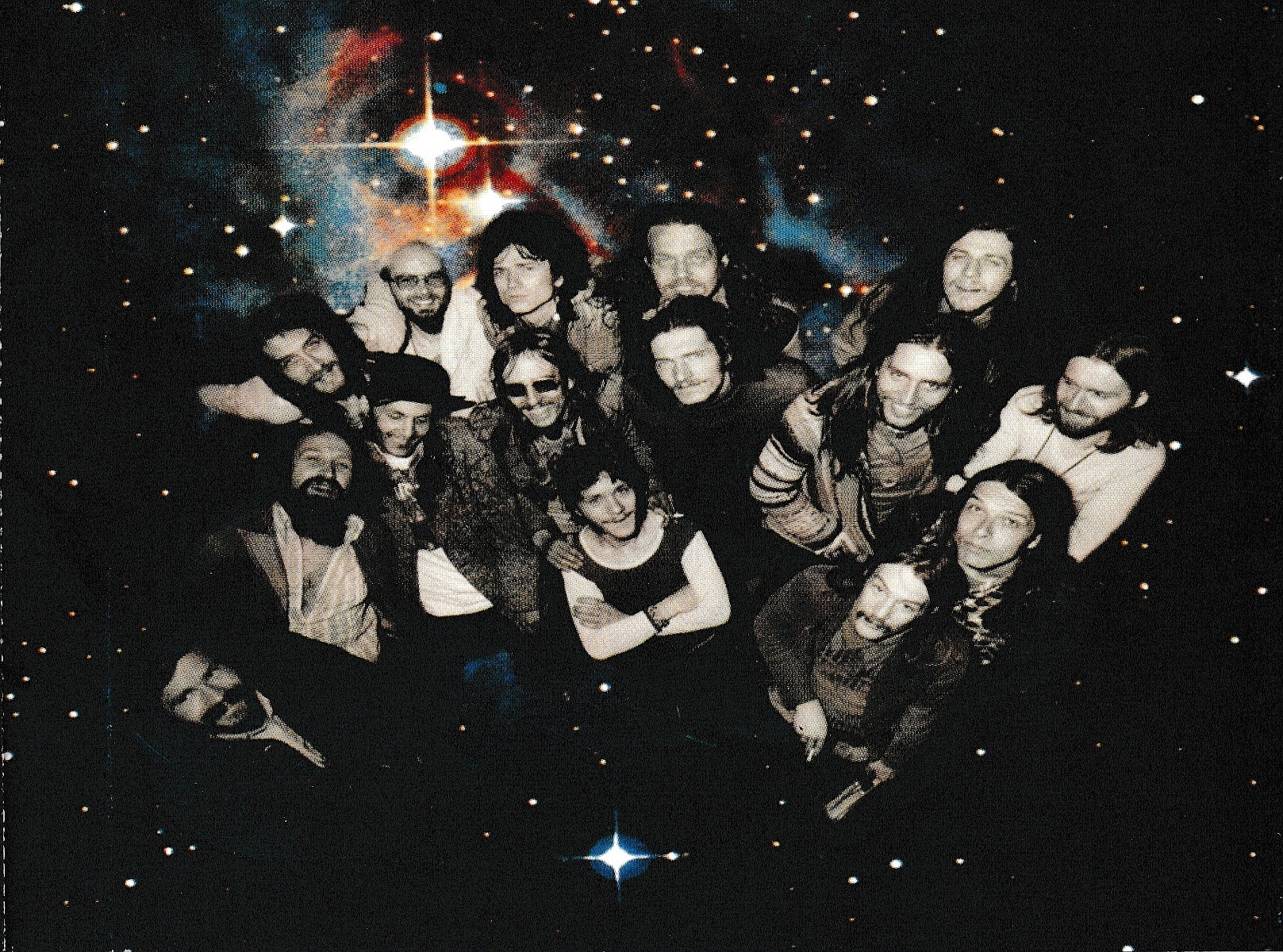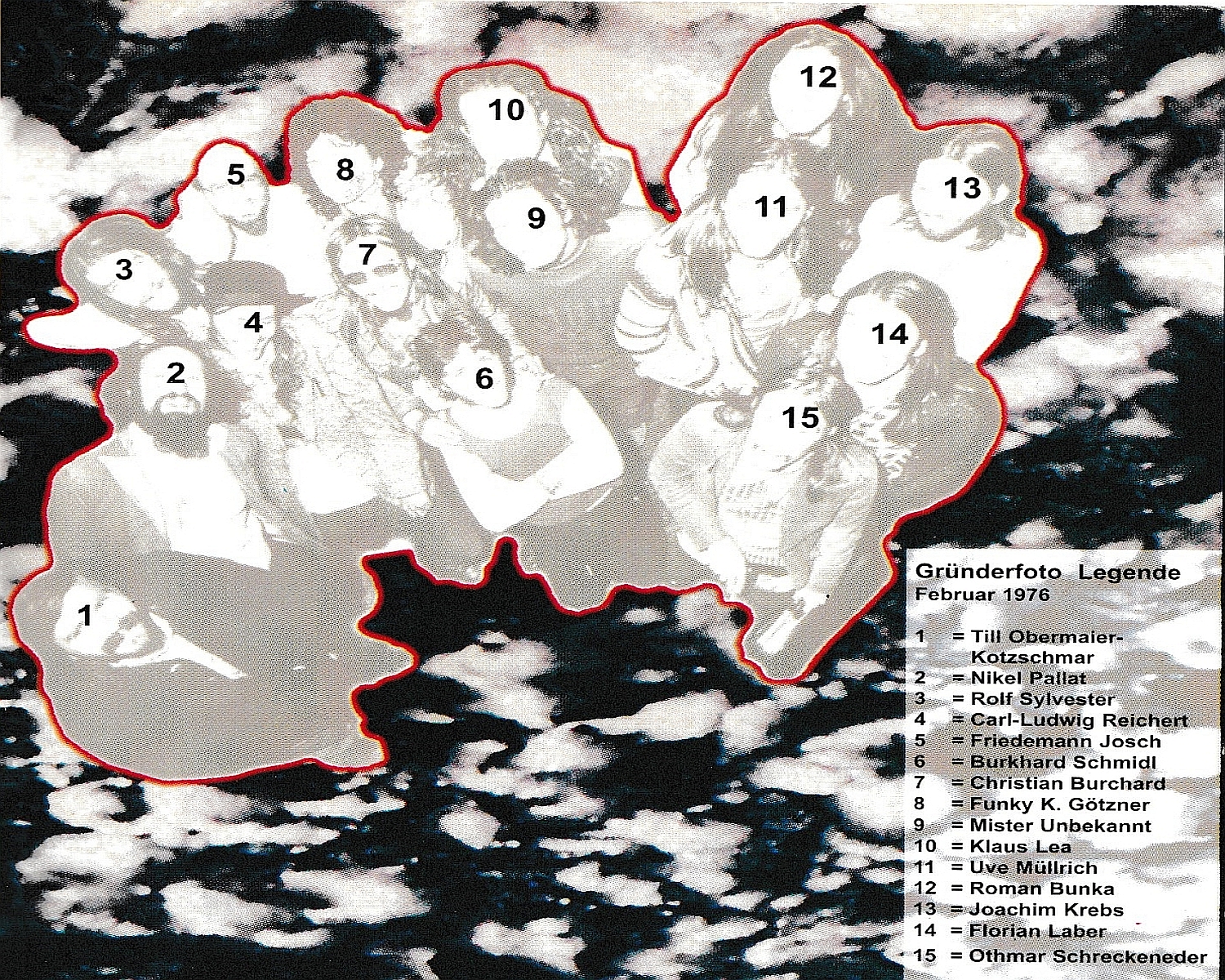Schneeball Records
distribution: INDIGO

1979 Checkpoint Charlie - erklärt. Schneeball What?!
SCHNEEBALL
was “independent” long before that word was adopted into German slang. Schneeball wasn’t the first independent label in what was then West Germany (FMP probably deserves that honor), but it was the first label that was completely organized and financed by the musicians. They did nearly everything themselves, and if the musicians didn’t do it personally, they checked it: the production, the cover design, the manufacturing and, together with a network of friends, the sales and distribution.
The motifs, production and LP distribution differed from one Schneeball band to another. Ton Steine Scherben had released their recordings, right from the start, on their own David Volksmund label and afterwards they wanted to set up a functional distribution. Embryo had already released seven LPs with four different record companies and they were simply fed up. Missus Beastly had been cold-bloodedly slain by their producer, so they were looking for an alternative way to publish their music. Sparifankal had made up their minds from the beginning that “we didn’t want to have anything to do with the industry.” Trikont Publishers in Munich provided a financial and organizational jumpstart. Scenting a new youth movement behind the Umsonst & Draussen festival, which was attracting larger audiences with each successive year (including more than 10,000 fans in Porta Westfalica in 1978), the music press published a spectrum of reportage ranging from benevolent to euphoric. But the first difficulties soon reared their ugly heads: Musikkooperative APRIL would have named itself after the month in the spring of 1976 when its first publications appeared, but the name had already been assigned. “We hadn’t considered that in the big, wide and faraway world of the huge CBS consortium, there already existed a small music publisher, not even a record label, that called itself ‘april music.’ We soon found out what happens when you pick a fight with a colossus like CBS, which had obviously been keeping a very close eye on the market and wasted no time in slapping us with a monstrous lawsuit. The value of the claim was set at 100,000 deutschmarks. We were a little independent dwarf, and we had absolutely no chance of battling a global conglomerate for a sum of that magnitude. We said to ourselves, ‘the cleverer one yields.’ After discussions lasting many long days and many sleepless nights, after sending circular letters for months and especially after carefully checking many commercial registers, we finally arrived at the glorious idea of calling the whole thing ‘SCHNEEBALL Records.’ The name was so totally un-businesslike that no one else was competing for it. But the name has survived all the way to the present day.” (Carl-Ludwig Reichert, SPARIFANKAL)
The idea of “music marketed by the musicians” was like a stone dropped into a pool: the waves spread in ever-widening circles. Bands that we were friends with, e.g. Checkpoint Charlie, Munju, Moira and the Real Ax Band, expressed their interest. But the founding bands wanted to keep their family-style, decentralized, organizational structure. “The personal relationship is more important than a big apparatus that might belong to us, but that develops a life of its own at some point.” (Schneeball Info No.5) The solution: “Create two, three, many Schneeballs.” But in the end, it turned out to be just one. And the second generation of Schneeball bands suddenly also belonged to the family. “There were big ideological discussions in the beginning. What are we actually doing here? Are we swapping records with one another or are we paying one another off? How should we handle the fact that recordings by one band sell better than those by another group? So that the first band doesn’t say, “We work for you and you make money off of us.’ Then the idea was, ‘No, we don’t swap recordings among ourselves. Instead, each one gets paid the money for the records that he sold. Without commissions, without everything. We don’t swap money among ourselves, only time.’ It was expected that each participating band would put records from the other bands into stores with the same enthusiasm as they put their own records there.” (Nikel Pallat, TON STEINE SCHERBEN)
But the noble plan couldn’t stand up to harsh reality. The label’s motto “music marketed by the musicians” was actually only valid during SCHNEEBALL’s beginning phase. Afterwards, the same structures which we had essentially wanted to overcome ultimately asserted themselves. The challenge of specialization was unavoidable, because musicians are notoriously incompetent bookkeepers. They won’t sort through a loose-leaf binder unless you threaten them with physical violence. And they don’t write payment reminders until they run out of cigarette money. Although there are naturally plenty of plausible explanations for that. ”Yeah, sure, we were sometimes, for example, in India for nine months....” (Christian Burchard, EMBRYO)
“Having to take a crash course in business management, being your own salesman and also remaining a creative musician – at some point all that turned out to be too many balls to juggle. Eventually it had to become a real distributor.” (Carl-Ludwig Reichert, SPARIFANKAL)
So a few good friends were asked if they would be willing to bring the records into stores in return for a few percent of the sales revenue. The friends soon discovered that they could sell many more records if they offered a broader selection. So they included into the distribution a few of the punk and new wave labels which were just getting started back then. In 1983, a loose-knit network of sales representatives ultimately evolved into the first German independent distributor: “Energie für Alle” or “EFA.” As the years went by, EFA spawned an offshoot. Three EFA employees from the early days, who felt that the business had become too large and that it’s assortment had become too arbitrary, founded INDIGO, which became Schneeball's new distributing company, because we switched right away. Over the years,
SCHNEEBALL has preserved its anarchical structure, almost like an extended family. There were many heads of that family, but the threads always run together and lead to the founding member and former Embryo manager Othmar Schreckeneder, who added several new genres to the label’s spectrum with diverse publications that encourage new and avant-garde listening experiences. These were in accord with the ideas of the artists, e.g. Die Wand An, Chris Karrer, Amon Düül 2, and radio plays by the Bayerischer Rundfunk.
was “independent” long before that word was adopted into German slang. Schneeball wasn’t the first independent label in what was then West Germany (FMP probably deserves that honor), but it was the first label that was completely organized and financed by the musicians. They did nearly everything themselves, and if the musicians didn’t do it personally, they checked it: the production, the cover design, the manufacturing and, together with a network of friends, the sales and distribution.
The motifs, production and LP distribution differed from one Schneeball band to another. Ton Steine Scherben had released their recordings, right from the start, on their own David Volksmund label and afterwards they wanted to set up a functional distribution. Embryo had already released seven LPs with four different record companies and they were simply fed up. Missus Beastly had been cold-bloodedly slain by their producer, so they were looking for an alternative way to publish their music. Sparifankal had made up their minds from the beginning that “we didn’t want to have anything to do with the industry.” Trikont Publishers in Munich provided a financial and organizational jumpstart. Scenting a new youth movement behind the Umsonst & Draussen festival, which was attracting larger audiences with each successive year (including more than 10,000 fans in Porta Westfalica in 1978), the music press published a spectrum of reportage ranging from benevolent to euphoric. But the first difficulties soon reared their ugly heads: Musikkooperative APRIL would have named itself after the month in the spring of 1976 when its first publications appeared, but the name had already been assigned. “We hadn’t considered that in the big, wide and faraway world of the huge CBS consortium, there already existed a small music publisher, not even a record label, that called itself ‘april music.’ We soon found out what happens when you pick a fight with a colossus like CBS, which had obviously been keeping a very close eye on the market and wasted no time in slapping us with a monstrous lawsuit. The value of the claim was set at 100,000 deutschmarks. We were a little independent dwarf, and we had absolutely no chance of battling a global conglomerate for a sum of that magnitude. We said to ourselves, ‘the cleverer one yields.’ After discussions lasting many long days and many sleepless nights, after sending circular letters for months and especially after carefully checking many commercial registers, we finally arrived at the glorious idea of calling the whole thing ‘SCHNEEBALL Records.’ The name was so totally un-businesslike that no one else was competing for it. But the name has survived all the way to the present day.” (Carl-Ludwig Reichert, SPARIFANKAL)
The idea of “music marketed by the musicians” was like a stone dropped into a pool: the waves spread in ever-widening circles. Bands that we were friends with, e.g. Checkpoint Charlie, Munju, Moira and the Real Ax Band, expressed their interest. But the founding bands wanted to keep their family-style, decentralized, organizational structure. “The personal relationship is more important than a big apparatus that might belong to us, but that develops a life of its own at some point.” (Schneeball Info No.5) The solution: “Create two, three, many Schneeballs.” But in the end, it turned out to be just one. And the second generation of Schneeball bands suddenly also belonged to the family. “There were big ideological discussions in the beginning. What are we actually doing here? Are we swapping records with one another or are we paying one another off? How should we handle the fact that recordings by one band sell better than those by another group? So that the first band doesn’t say, “We work for you and you make money off of us.’ Then the idea was, ‘No, we don’t swap recordings among ourselves. Instead, each one gets paid the money for the records that he sold. Without commissions, without everything. We don’t swap money among ourselves, only time.’ It was expected that each participating band would put records from the other bands into stores with the same enthusiasm as they put their own records there.” (Nikel Pallat, TON STEINE SCHERBEN)
But the noble plan couldn’t stand up to harsh reality. The label’s motto “music marketed by the musicians” was actually only valid during SCHNEEBALL’s beginning phase. Afterwards, the same structures which we had essentially wanted to overcome ultimately asserted themselves. The challenge of specialization was unavoidable, because musicians are notoriously incompetent bookkeepers. They won’t sort through a loose-leaf binder unless you threaten them with physical violence. And they don’t write payment reminders until they run out of cigarette money. Although there are naturally plenty of plausible explanations for that. ”Yeah, sure, we were sometimes, for example, in India for nine months....” (Christian Burchard, EMBRYO)
“Having to take a crash course in business management, being your own salesman and also remaining a creative musician – at some point all that turned out to be too many balls to juggle. Eventually it had to become a real distributor.” (Carl-Ludwig Reichert, SPARIFANKAL)
So a few good friends were asked if they would be willing to bring the records into stores in return for a few percent of the sales revenue. The friends soon discovered that they could sell many more records if they offered a broader selection. So they included into the distribution a few of the punk and new wave labels which were just getting started back then. In 1983, a loose-knit network of sales representatives ultimately evolved into the first German independent distributor: “Energie für Alle” or “EFA.” As the years went by, EFA spawned an offshoot. Three EFA employees from the early days, who felt that the business had become too large and that it’s assortment had become too arbitrary, founded INDIGO, which became Schneeball's new distributing company, because we switched right away. Over the years,
SCHNEEBALL has preserved its anarchical structure, almost like an extended family. There were many heads of that family, but the threads always run together and lead to the founding member and former Embryo manager Othmar Schreckeneder, who added several new genres to the label’s spectrum with diverse publications that encourage new and avant-garde listening experiences. These were in accord with the ideas of the artists, e.g. Die Wand An, Chris Karrer, Amon Düül 2, and radio plays by the Bayerischer Rundfunk.

